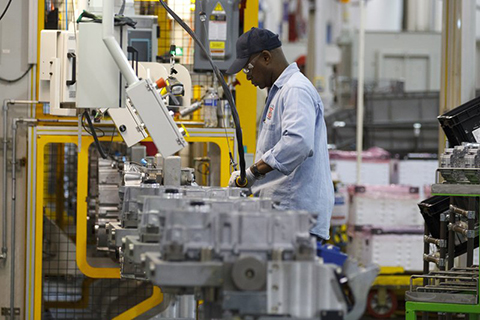By The Associated Press
Defying a wave of layoffs that has sent the U.S. job market into its worst catastrophe on record, at least one major industry is making a comeback. Tens of thousands of auto workers are returning to factories that have been shuttered since mid-March because of fears of spreading the coronavirus.
The auto industry is among the first major sectors of the economy to restart its engine.
About 133,000 U.S. workers — just over half of the industry’s workforce before the pandemic — are expected to pour back into assembly plants that will open in the coming week, according to estimates by The Associated Press. A staggering 36 million people have now sought jobless aid in just the two months since the virus first forced businesses to close and shrink their work forces.
Here are some of AP’s top stories Friday on the world’s coronavirus pandemic. Follow APNews.com/VirusOutbreak for updates through the day and APNews.com/UnderstandingtheOutbreak for stories explaining some of its complexities.
WHAT’S HAPPENING TODAY:
__ The Democratic-controlled House is pressing ahead with votes on another massive rescue bill that would pump almost $1 trillion to state and local governments, renew $1,200 cash payments for individuals, and extend a $600 weekly supplemental federal unemployment benefit. The first four coronavirus response bills were bipartisan measures that passed by sweeping votes, but Friday’s measure — with a $3 trillion-plus price tag that exceeds the prior bills combined — promises to pass largely along party lines.
__ American industry suffered the most severe plunge on record last month with factories, mines and utilities battered by the coronavirus pandemic. The Federal Reserve said Friday its industrial production index tumbled a record 11.2% in April.
__ Shuttered sectors of New York’s upstate economy will begin inching back to life Friday with more construction, manufacturing and curbside retail pickups allowed in parts of the state that are miles away from pandemic-stricken New York City. The smaller cities and rural regions of upstate New York have been spared the brunt of the coronavirus outbreak. Gov. Andrew Cuomo is allowing many of those areas to gradually reopen first, industry by industry.
__ Students and teachers say they’re doing their best to finish the academic year amid the pandemic through remote learning in Venezuela, where electricity and the internet are unreliable. President Nicolás Maduro ordered classes to continue after setting a nationwide quarantine in mid-March to slow the new coronavirus’ spread.
__ An American cargo pilot who acknowledged “poor judgment” in breaking a quarantine order to buy medical supplies became the first foreigner imprisoned in Singapore for breaching its restrictions meant to curb the coronavirus. FedEx pilot Brian Dugan Yeargan, of Alaska, was sentenced to four weeks Wednesday after he pleaded guilty to leaving his hotel room for three hours to buy masks and a thermometer, says defense lawyer Ronnie Tan.
__ Trying to silence criticism over the coronavirus pandemic, China is deploying a well-used weapon — trade sanctions. Beijing has blocked some imports of Australian beef after Prime Minister Scott Morrison’s government, endorsed by Washington, called for a robust inquiry into the origins of the outbreak and rebuffed Chinese demands to back off.
__ Germany and several other European countries where the coronavirus spread has slowed were moving ahead Friday with relaxing border restrictions, while flare-ups in Mexico and elsewhere served as a reminder the pandemic is far from over. Slovenia, which has been gradually easing strict lockdown measures, declared that the spread of the virus is now under control and European Union residents could enter from Austria, Italy and Hungary.
___
WHAT YOU NEED TO KNOW:
For most people, the coronavirus causes mild or moderate symptoms, such as fever and cough that clear up in two to three weeks. For some, especially older adults and people with existing health problems, it can cause more severe illness, including pneumonia and death. The vast majority of people recover.
Here are the symptoms of the virus compared with the common flu.
One of the best ways to prevent spread of the virus is washing your hands with soap and water. The U.S. Centers for Disease Control and Prevention recommends first washing with warm or cold water and then lathering soap for 20 seconds to get it on the backs of hands, between fingers and under fingernails before rinsing off.
You should wash your phone, too. Here’s how.
TRACKING THE VIRUS: Drill down and zoom in at the individual county level, and you can access numbers that will show you the situation where you are, and where loved ones or people you’re worried about live.
___
ONE NUMBER:
__ 1,458: Few states are rebooting from the coronavirus pandemic quicker than Texas, where stay-at-home orders expired May 1. Cases are still rising, including single-day highs of 1,458 new cases and 58 deaths on Thursday. Republican Gov. Greg Abbott has defended the pace by emphasizing steadying hospitalization rates and pointing out Texas’ 1,200 deaths are still behind similarly big states, including California and Florida.
__ BE ACTIVE: Beach volleyball star Kerri Walsh Jennings knew the national stay-at-home orders would be especially hard on young athletes and others trying to stay fit. With her own quest for a sixth Olympics on hold because of the coronavirus pandemic, Walsh Jennings held video chats with dozens of volleyball clubs and teams — more than 4,500 people in all — with a message to remain active when it’s much easier to just binge on TV.
__ SONG CONTEST SILENCED: Over its many years, the Eurovision Song Contest has come to be a sign of the times. So it is perhaps fitting that, in coronavirus times, nothing will be happening Saturday at the scheduled venue of the Ahoy Hall in the Dutch port city of Rotterdam.
___
Follow AP coverage of the virus outbreak at https://apnews.com/VirusOutbreak and https://apnews.com/UnderstandingtheOutbreak




